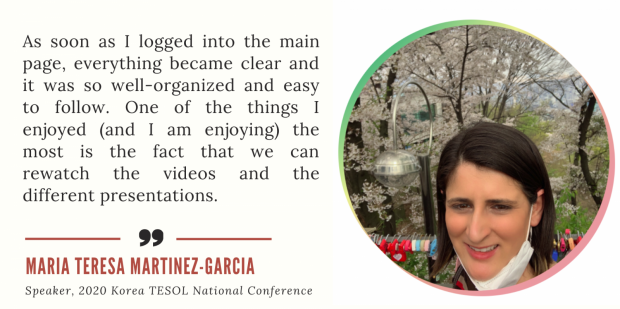
In response to the COVID-19 pandemic, KOTESOL had to rethink this year’s spring national conference. From these difficult circumstances, the administrators created a conference that was the first of its kind. It was all online; presenters showcased their work by streaming or through prerecorded video. Attendance was free for anyone interested; all they needed was a decent internet connection. Like all KOTESOL events--but especially this one--we are interested in hearing from presenters and attendees.
Here is a short interview featuring María Teresa Martínez-Garcia, who is an assistant professor at Hankuk University of Foreign Studies, about her experience from our first online conference.
1. How was the online conference? What were the highlights? How was the experience relative to your expectations before attending?
Before the actual conference, I was a little bit hesitant. I had clear what I was supposed to be doing as a presenter (be ready to answer questions through any of the venues provided by the organization), but I was not sure about the actual conference and how to enjoy some of the different talks. However, as soon as I logged into the main page, everything became clear and it was so well-organized and easy to follow. One of the things I enjoyed (and I am enjoying) the most is the fact that we can rewatch the videos and the different presentations. So this time I can watch all the different presentations in which I'm interested, without having to miss any due to the parallel sessions. Also, the plenary speaker gave us some really good advice to face our classes here in South Korea.
2. Can you talk about your research interests and background?
I completed my PhD in Linguistics at the University of Kansas in August 2016. My research interests focus primarily on experimental linguistics (bilingualism and second language speech perception and production) and pedagogical approaches to the teaching of foreign languages (teaching strategies and approaches, like translanguaging, the topic I discussed in my presentation at the latest KOTESOL conference). Currently, I work as an assistant professor in the Spanish department at Hankuk University of Foreign Studies.
3. How did you become a KOTESOL member and how has KOTESOL helped you professionally?
I became a member of KOTESOL completely by chance last Fall. In my free time, I work as a volunteer teaching English to underprivileged children and, while looking for ways to promote our volunteer work, I came across the International Conference. I joined the conference last fall and I presented a poster regarding the work of the non-profit organization where I volunteer. I also attended all the talks during that weekend and I realized that this was the type of organization and conference I had been looking for since I moved to Korea almost 3 years ago. I work in a Spanish department, but none of my work is related to literature, like what the majority of my colleagues do, and there is not a proper conference in Spanish Applied Linguistics (or similar) in the country. I found KOTESOL by chance, but definitely I will continue being a member and learning from my colleagues (while presenting my own work) for as long as I can.
4. What are your thoughts on translanguaging? Can you tell us about your presentation?
This is a really difficult question to answer, as there is not even a unique (or definite) definition of the concept. While I do not want to get into the discussion on how much of a social construct it is behind the idea of "translanguaging" (which is important but now exactly how I have studied it until now), I do see it from a psycholinguistics perspective. For me, translanguaging is a pedagogical approach that tries to reinforce the teaching of a second language, through some mechanisms that we know are associated with second language acquisition. For example, we know that in the first stages of acquiring a language, the individual needs to translate certain (if not all) concepts to their native language. Why would we then force them to only use the foreign language in the classroom? What about reinforcing this process of translating by implementing other mechanisms that will help students go through this phase faster and more successfully? For me, "translanguaging" is not only "translating into the native language", but implementing a series of approaches that will help students succeed in the acquisition process while making use of their already acquired knowledge. In my presentation for KOTESOL 2020, I tried to discuss some of the strategies that instructors and students themselves could implement to make this process more successful.
5. How has the recent trend of online teaching affected you professionally? What advice would you like to offer to other language instructors?
This semester is not easy, and I'm sure all my colleagues would agree with me. Most of us had the whole semester already prepared (or mostly prepared) to be administered in the traditional classroom, and we had to transition to online teaching without having a lot of time to do it or even the resources necessary to do it successfully. And part of the problem is not knowing exactly how things will continue, as we don't know if we will start in-person classes any time soon or we will continue online for the rest of the semester. In my case, I already enrolled as a student in some classes back at the beginning of March on how to teach online. For me, knowing what things work and do not work has been really useful to implement my own classes as an instructor.
Author
Cyril Reyes is an assistant professor at Woosong University and was a publicity manager at the 2019 Korea TESOL International Conference.


